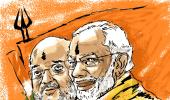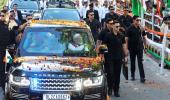There are challenges galore before him, and it is not going to be easy.
In the next four years, he has to conjure a system that changes the optics about him and the BJP both nationally and internationally so that he can ride back on his own, claim the top slot, and not have to lean on a coalition, asserts Ramesh Menon, author of Modi Demystified: The Making Of A Prime Minister, as Modi 3.0 completes a year in power.

Eleven years is a long time in the life of any serving prime minister.
Narendra Damodardas Modi has managed to stay on, and indications are that he will not only complete this term but will throw in his hat for strategising and leading the BJP into the 2029 parliamentary elections.
There were murmurs in political circles that, as he would soon be 75, he would retire, as it is the norm he had set for party leaders like L K Advani and Murli Manohar Joshi. But rules can change, and he will ensure that.
There are challenges galore before him, and it is not going to be easy. In the next four years, he has to conjure a system that changes the optics about him and the BJP both nationally and internationally so that he can ride back on his own, claim the top slot, and not have to lean on a coalition.
Ever since the coalition partners were sworn in, they have not uttered a harsh word against Modi, and it is unlikely that they would in the future, as they are so desperate to be in power and would not like to rock the boat despite choppy waters.
Bihar would be the litmus test for Modi now as he would want his party to get a strong foothold there in the coming assembly elections and neutralise the shaky leadership of Nitish Kumar. If not, the party would have to play second fiddle with a jaded Janata Dal-United leader.
That will not portend well with the next assembly election in Tamil Nadu and Kerala.
At the moment, the short war with Pakistan has made the BJP and Modi feel that they are back in the saddle and have the backing of the electorate.
Even in Kerala, where the BJP does not have a single MLA, party workers hope they will finally make a dent in the coming assembly elections.
Handling the exigencies of politics and elections is one thing, but many other challenges, like handling the economy, are more serious.
This would require a set of bold reforms that will not be populist and are going to raise some rancour.
It has been pending for a long time, and the economy cannot wait for another election and a majority government.
If India has to zoom ahead towards becoming a five trillion economy as Modi has targeted, there has to be a better rate of growth that can be stimulated with reforms.
Rating agencies have not painted a rosy picture of GDP growth.
However, due to its size, India will continue to grow and remain one of the fastest-growing economies, but that is hardly enough.
The disparities between the rich and the poor are increasing, and the middle class is limping under the burden of taxes, taxes, and more taxes.
Significant rationalisation is needed regarding GST in the tax structure. Taxes on health insurance and other entities that help commoners must be removed.
Most taxpayers would not grudge paying taxes if they saw that it was used to improve infrastructure and the quality of their lives. But increasingly, they are seeing it being frittered away.
One just has to look around to see the festering corruption in infrastructure projects and other senseless ideas with narrow political motives.
We need to set priorities depending on what is good for the country, and not good for one political party desperate to win an election.

The employment scenario is bleak, with millions of educated youngsters grappling with the reality of a lack of opportunities.
According to a ministry of statistics and programme implementation survey, 13.8 per cent of youth in the 15 to 29 age bracket are unemployed.
Many graduates today find no jobs as their skills are mediocre, and the system they studied in was not engineered to build real skills or even knowledge and perspective.
Former president A P J Abdul Kalam remarked that most of our engineering graduates were unemployable because of mediocre education policies and poor public school environments.
Employers are struggling to find enough skilled workers. They complain about the poor output of India's colleges, as the education system is deeply flawed. Graduates do not have the knowledge bandwidth they are expected to and many of them are unemployable.
Modi cannot ignore education and skill development. That must become one of his top priority areas.
Lakhs of Indian students have winged away to study at foreign universities, not because they can afford it, but hoping to build a better future in other lands that recognise merit and talent.
In the last five years, there has been a 52 per cent increase in the number of Indians studying abroad, according to the education ministry. The numbers have swelled from 5.86 lakh in 2019 to over 9 lakh.
Many of them will not return if they find jobs abroad. While it is good to have a thriving diaspora abroad, the situation at home cannot be ignored.
Imagine the kind of talent India would have if there were reverse migration as conditions back home start looking up with better governance, transparency, equal playing fields, and peaceful social environments.
Both the Centre and the states are now bleeding financially due to freebies that political parties, including the BJP, offered to ride to power.

This has to stop.
Just the PM Garib Kalyan Yojana, which has 800 million beneficiaries, has a cost of over rupees two lakh crore! It is drilling a hole into the Union Budget. There is no end to it, as there will be more freebies announced when an election is announced.
Modi needs to be brave enough to gauge the high costs incurred for such populist schemes just to win elections, and instead educate the electorate on the damage to the state and national exchequer.
Farmers have to be consulted before agriculture reforms are introduced, as there is a trust deficit after the farm agitation against changes that the government wanted to introduce.
India is an agricultural economy, and we need to get the best out of it with not only much-needed reforms, price structures, movement towards horticulture, weaning away from water-guzzling crops like rice, organic farming and limited use of pesticides and chemical fertilisers.
India needs a second green revolution, but it has to be thought through, and the mistakes of the past have to be rectified. Sustainable agriculture is the only way forward.

In the last decade, federalism has seen fractures more than ever before. That needs repair if India is to march toward becoming a developed nation.
States like Kerala, Tamil Nadu, Karnataka, West Bengal, and Punjab are sensing that they are being discriminated against or treated differently, as a non-BJP government is ruling there.
Modi is India's prime minister, and not just for the BJP-ruled states.
In all the Opposition-ruled states, the governors have been sparring with the state government and not helping them bring in good governance and the speedy implementation of schemes.
It took the Supreme Court to pull up the Tamil Nadu governor for being a hurdle to the DMK-led government.
When the Aam Aadmi Party was in power in Delhi, there was constant friction between the lieutenant governor and the chief minister and his colleagues for the last ten years. Today, when there is a BJP government in power, headed by Chief Minister Rekha Gupta, there has not been even one altercation in the first 100 days of its reign. Files are moving, and plans for Delhi are cleared.
India has to aggressively get into manufacturing and has to be provided the necessary support and best technology available. 'Made in India' has to rise above a mere good-sounding slogan.
It is one way to edge out poorly made Chinese goods from the Indian market. It is not going to be easy, but it has to be done to create jobs, create demand for infrastructure, and become as self-reliant as possible.
There is a lot of hype about India today being the fourth-largest economy in terms of GDP in the world. That is because of its size and population. The real challenge is to raise the per capita income, where India's position is 136 out of 188 countries. It is also the lowest among G20 nations.
On the foreign relations front, India has a lot to do. Think of China, Bangladesh, Afghanistan, Pakistan, Nepal, Sri Lanka and even the Maldives. Mending relations with any of them is complicated.
It is not a pretty picture. It is also not an easy task, as any government will have to struggle to deal with the complicated nature of these countries and their vexed relationship with India.

Manipur has been on the boil for over a year now. Thousands have been rendered homeless in ethnic clashes, and hundreds have been killed. The strife does not show signs of dying.
Modi has not visited the state nor done anything to bring peace and heal wounds.
Instead, the BJP chief minister, N Biren Singh, was allowed to continue for so long despite failing to control the situation. Manipur's strife and Modi's inaction are not good optics for the party that keeps talking of 'double engine' governance.
India has seen a spike in communal violence, and though it is blatantly allowed to continue, Modi has not done anything to stop it. It might be to feed electoral politics by creating fractures between communities, but in the long run, the collateral damage will be permanent.
What Modi also needs to figure out is that if there is no peace and stability in society, no foreign investor would want to come to India despite it being such a large market. Peace not only heals but can also boost the economy.
The challenges before Modi are existential tests of governance, federal trust, and national cohesion and inclusiveness. If India is to rise, it needs a visionary leader who can look beyond winning elections and has the wisdom to perceive that a lasting legacy is built not through spectacle but through stewardship.
Ramesh Menon is an author, award-winning journalist, educator, documentary filmmaker and corporate trainer.
Feature Presentation: Aslam Hunani/Rediff










